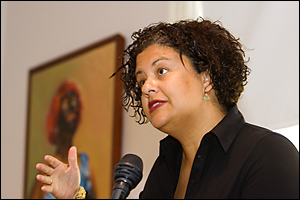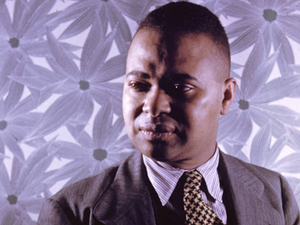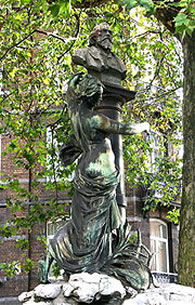De Amerikaanse dichteres en schrijfster Elizabeth Alexander werd geboren op 30 mei 1962 in New York. Zie ook alle tags voor Elizabeth Alexander op dit blog.
Autumn Passage
On suffering, which is real.
On the mouth that never closes,
the air that dries the mouth.
On the miraculous dying body,
its greens and purples.
On the beauty of hair itself.
On the dazzling toddler:
“Like eggplant,” he says,
when you say “Vegetable,”
“Chrysanthemum” to “Flower.”
On his grandmother’s suffering, larger
than vanished skyscrapers,
September zucchini,
other things too big. For her glory
that goes along with it,
glory of grown children’s vigil,
communal fealty, glory
of the body that operates
even as it falls apart, the body
that can no longer even make fever
but nonetheless burns
florid and bright and magnificent
as it dims, as it shrinks,
as it turns to something else.
Islands Number Four
1.
Agnes Martin, Islands Number Four,
Repeated ovals on a grid, what appears
To be perfect is handmade, disturbed.
Tobacco brown saturates canvas to burlap,
Clean form from a distance, up close, her hand.
All wrack and bramble to oval and grid.
Hollows in the body, containers for grief.
What looks to be perfect is not perfect.
Odd oval portholes that flood with light.
2.
Description of a Slave Ship, 1789:
Same imperfect ovals, calligraphic hand.
At a distance, pattern. Up close, bodies
Doubled and doubled, serried and stacked
In the manner of galleries in a church,
In full ships on their sides or on each other.
Isle of woe, two-by-two, spoon-fashion,
Not unfrequently found dead in the morning.
Slave ships, the not pure, imperfect ovals,
Portholes through which they would never see home,
The flesh rubbed off their shoulders, elbows, hips.
Barracoon, sarcophagus, indestructible grief
Nesting in the hollows of the abdomen.
The slave ship empty, its cargo landed
And sold for twelve ounces of gold apiece
Or gone overboard. Islands. Aftermath.

Elizabeth Alexander (New York, 30 mei 1962)
De Afro-Amerikaanse dichter Countee Cullen werd geboren als Countee LeRoy Porter op 30 mei 1903 in Louisville, Kentucy, of Baltimore. Zie ook alle tags voor Countee Cullen op dit blog.
From the Dark Tower
We shall not always plant while others reap
The golden increment of bursting fruit,
Not always countenance, abject and mute,
That lesser men should hold their brothers cheap;
Not everlastingly while others sleep
Shall we beguile their limbs with mellow flute,
Not always bend to some more subtle brute;
We were not made to eternally weep.
The night whose sable breast relieves the stark,
White stars is no less lovely being dark,
And there are buds that cannot bloom at all
In light, but crumple, piteous, and fall;
So in the dark we hide the heart that bleeds,
And wait, and tend our agonizing seeds.
Saturday’s Child
Some are teethed on a silver spoon,
With the stars strung for a rattle;
I cut my teeth as the black racoon–
For implements of battle.
Some are swaddled in silk and down,
And heralded by a star;
They swathed my limbs in a sackcloth gown
On a night that was black as tar.
For some, godfather and goddame
The opulent fairies be;
Dame Poverty gave me my name,
And Pain godfathered me.
For I was born on Saturday–
“Bad time for planting a seed,”
Was all my father had to say,
And, “One mouth more to feed.”
Death cut the strings that gave me life,
And handed me to Sorrow,
The only kind of middle wife
My folks could beg or borrow

Countee Cullen (30 mei 1903 – 9 januari 1946)
De Vlaamse dichter en schrijver Emmanuel Hiel werd geboren in Sint-Gillis-bij-Dendermonde op 30 mei 1834. Zie ook alle tags voor Emmanuel Hiel op dit blog.
Een werkman
Door hageljacht en wind,
In de overgroote stad,
Een lieflik bedelkind,
Zong, ’t oog van tranen nat…
Haar lied voor ’t beetje brood,
Drong dwars door been en merg:
Wie helpt haar uit den nood?
Het is te zwak voor ’t werk!
Een rijke loopt voorbij,
Misschien vol medelij?
Een volksstroom rolt voorbij,
Gevoelloos als de tij!
Geen herte wordt geraakt,
De wind waait door heur rok,
En zijn heur voeten naakt,
Ze warmt ze in ’t sneeuwgevlok.
Een schaamle werkman kwam,
Hij keek naar ’t kindje heen,
Toen hij heur handje nam,
Sprak hij: ‘Staak uw gesteen…
Uw ouders! snikt ge, dood!
Kom, kind, de storm woelt ruw…
Kom, is mijn last, ach, groot!
Mijn kindren wachten u.’.

Emmanuel Hiel (30 mei 1834 – 27 augustus 1899)
Borstbeeld in Schaarbeek
Onafhankelijk van geboortedata:
De Vlaamse dichter Jan Geerts werd geboren in Hoogstraten in 1972. Zie ook alle tags voor Jan Geerts op dit blog.
Zwaartekracht
We liggen op onze rug, in onze open armen
verwelkomt zich een afscheid. Je praat maar
anders dan ervoor. Alsof het niet zo bedoeld was.
Alsof de lichamen waarin we liggen het vermogen
om ons te bestaan kwijt zijn. Het kan beginnen, het
vallen in de diepzee boven ons, het verdrinken in de lucht.
We wilden wat de vogels deden, maar
we waren het land waarover de wind
met de vogels daarin. En zonder de vogels
waren we nooit het land geweest.

Jan Geerts (Hoogstraten, 1972)
Zie voor nog meer schrijvers van de 30e mei ook mijn blog van 30 mei 2011 deel 1 en eveneens deel 2.
